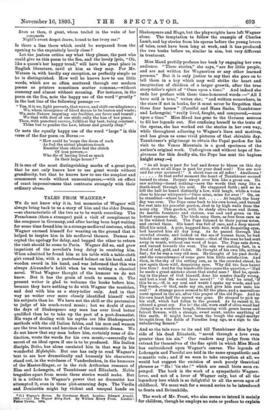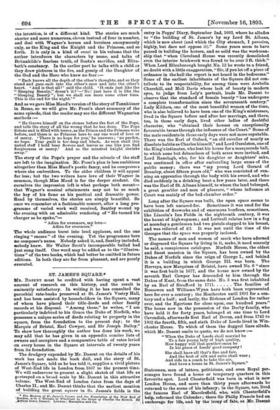TALES FROM WAGNER.*
WE do not know why it is, but memories of Wagner will always bring back to us a story of him and the elder Dumas, —so characteristic of the two as to be worth recording. The Frenchman (then a stranger) paid a visit of compliment to the composer in Germany, and after having been kept waiting for some time found him in a strange medival costume, which Wagner excused himself for wearing on the ground that it helped to inspire him in his medieval themes. Dumas ac- cepted the apology for delay, and begged the other to return the visit should he come to Paris. Wagner did so, and grew impatient of the novelist's long delay in receiving him. When admitted he found him at his table with a table-cloth girt round him, with a pasteboard helmet on his head, and a wooden sword in his hand, and was informed that this was always Alexander's habit when he was writing a classical novel. What Wagner thought of the humour we do not know. But it has the grain of truth to season it. The present writer is glad to welcome the books before him, because they have nothing to do with Wagner the musician, and deal with him as a story-teller only. And in that way no writer ever more closely identified himself with his subjects than he. We have not the skill or the pretension to judge of his much-vexed music ; but we doubt if since the days of Shakespeare any man has ever lived better qualified than he to take up the part of a poet-dramatist. His ways of dealing with his myths are like Shakespeare's methods with the old Italian fables, and his men and women are the true heroes and heroines of the romantic drama. We do not know that any man before him, certainly none of dis- tinction, wrote the words for his own music,—assuredly the secret of an ideal opera if one is to be produced. His Italian disciple, Boito, has alone emulated him in that way in his wonderful Mefistofele. But one has only to read Wagner's text to see how dramatically and humanly his characters stand out, in the weirdness of Vanderdecken, in the humours of the Master-Singer, or in the rich Arthurian romance of Elsa and Lohengrin, of Tannhinser and Elizabeth. Noble tragedies apart from music these stories would make. But it is a tribute to Wagner's power that no dramatist has attempted it, even in these plot-annexing days. The Verdis and Donizettis might lay violent and unequal hands on • (1) Wagner's Htroes. By Constance EandL London: Edward Arnold. 1895.—(2.) Tho Wagner Story Book. By William Henry Frost. London : usher Ernwin. 1894.
Shakespeare and Hugo, but the playwrights have left Wagner alone. The temptation to follow the example of Charles Lamb, and lay stories from his operas before the young lovers of tales, must have been long at work, and it has produced the two books before us, similar in aim, but very different in treatment.
Miss Maud prettily prefaces her book by engaging her own audience. "These stories," she says, "are for little people, and are not written for Wagnerites or any other learned persons." But it is only justice to say that she goes on to tell them in a key which may well strike the heart and imagination of children of a larger growth, after the true story-teller's spirit of "Once upon a time." And indeed she ' ends her preface with those time-honoured words :—" All I have said is true," writes she; "and written somewhere, in the stars if not in books, for it must never be forgotten that these four heroes" (Parsifal and Hans Sachs, Tannhauser and Lohengrin) "really lived, fought, and conquered,—once upon a time." Miss Maud has gone to the German sources to fill her legends out. Not confining herself to the texts of the operas, she has worked out the stories in her own way, while throughout adhering to Wagner's lines and motives, and has given us some vivid pictures of that chivalric day. Tannhanser's pilgrimage to obtain the Papal pardon for his visit to the Venus Mountain is a good specimen of the author's original work. Unforgiven and without hope of for- giveness for this deadly sin, the Pope has sent the hapless knight away :--I "As all hope is past for leaf and flower to bloom on this dry stick, even so all hope is past for your dead soul ! You are now and for ever accursed ! ' A shout rose on all sides ! Anathema!
In that awful moment the heart of Tannhiluser seemed turned to stone. Despair swept over him like a great sea. Ile saw nothing—heard nothing—save the words that rang like a death-knell through his soul. He staggered forth ; and as he left the hall he heard distinctly a low, wild laugh, while a voice close to his ear whispered—' Once mine, mine for ever ! ' On, on he stumbled—where he heeded not At length the busy day was over. The Pope came back to his own house, and turned for rest into his peaceful garden, shut in by high walls from the noisy city. This garden, with its shady olive trees and ilexes, its marble fountains and statues, was cool and green on the hottest summer day. The birds sang there, as free from care as in the wildest forest. The Pope listened to their joyous notes, and envied them. His heart was full of care, and a deep unrest filled his mind. A pale, haggard face, with wild despairing eyes, had haunted him all day long. As he passed through the crowded streets, and looked on the sea of human faces, he had beheld one only. Always the same,—that of the man he had sent away in wrath, without one word of hope. The Pope sate down, and turned towards the west. The sun was sinking fast, in a flood of red, gold, and violet. He thought of his own life, setting fast ; for he was a very old man. He thought of his past deeds ; and the remembrance of some gave him little satisfaction. And then, in the sky of the setting sun, as in the crowded street, he saw again those wild, despairing eyes. Why did the face haunt him thus 7 And for the hundredth time came the question,—' Had he made a great mistake about that sinful man ? Had he, speak- ing in the place of God himself, done his master deadly wrong, and lost a soul He would have saved?' ' 0 God,' he cried, 'if this be so,—if, in my zeal and wrath I spake my words, and not Thy words,-0 God, undo my sin, and give him rest unto his soul !' A strange peace seemed to fill the place, and a marvellous. scent spread in the air, after this prayer of the old Pope. And in his own heart half the unrest was gone. He stooped to pick up his staff, which had fallen to the ground. As he raised it, he uttered a great cry. For lo ! the old, worn staff of olive-wood had changed to a wondrous bough, blossoming with green leaves and fairest flowers, with a strange, sweet scent, unlike anything of this earth. It might have been the bough the angel-martyr brought from the fields of Paradise long ago, as a sign to the unbelieving Roman."
And so the tale runs to its end till Tannhauser dies by the side of his dead Elizabeth, " saved through a love even greater than his sin." Our readers may judge from this extract for themselves of the fine spirit in which Miss Maud has embroidered upon Wagner's canvas. The legends of Lohengrin and Parsifal are told in the same sympathetic and rcmantic vein ; and if we were to take exception at all, we would but suggest the excision of such purely theatrical phrases as "Ha! 'tis she !" which are small blots Boon ea- pnnged. The book is the work of a sympathetic Wagner- lover, and not of a lover of Wagner only, but of all the legendary lore which is so delightful to all the seven ages of
childhood. We must wait for a second series to be introduced to Senta and Briinnhilde.
The work of Mr. Frost, who also seems to intend it mainly for children, though he employs no note or preface to explain the intention, is of a different kind. The stories are much shorter and more numerous, eleven instead of four in number, and deal with Wagner's heroes and heroines anonymously only, as the King and the Knight and the Princess, and so forth. It is only in a kind of envoi to his volume that the author introduces the characters by name, and talks of Briinnhilde's fearless truth, of Senta's sacrifice, and Eliza- beth's constancy. In the earlier part he talks with a child as they draw pictures in the fire, and gossip of the Daughter of the God and the Hero who knew no fear :— " Each knows all the depth of the other's thoughts, and so they stand and gaze each into the other's eyes and into the other's heart. And is that all?' said the child. 'It ends just like the ." Sleeping Beauty," doesn't it F'—' No ! just here it is like the
Sleeping Beauty "; but we shall see more some other time. This is the end for the night."
And as we gave Miss Maud's version of the story of Tannhauser in Rome, so we will give Mr. Frost's short summary of the same episode, that the reader may see the different Wagnerian methods :—
" He throws himself on the stones before the feet of the Pope, and tells the story of all the wrong that he has done. The Pope listens and is filled with terror, as the Prince and the Princess were before, and there is no Princess here to say one word of love or of mercy. There is no hope for you,' he answers ; no pardon, no hope. Your guilt is too deep and black. As soon shall this naked staff I hold bear flowers and leaves as one like you find forgiveness or mercy.' And so the minstrel knight shrinks away."
The story of the Pope's prayer and the miracle of the staff are left to the imagination. Mr. Frost's plan is less ambitions altogether than Miss Maud's poetic fancy, and he compresses where she embroiders. To the older children it will appeal far less; but the two writers have love of their Wagner in common, though Miss Maud is far the deeper student. On ourselves the impression left is what perhaps both meant— that Wagner's musical attainments may not be so much the key of his fame as his poetical and dramatic power. Read by themselves, the stories are simply beautiful. So once we remember at a fashionable concert, after a long pro- gramme of varied work well received, Santley wound up the evening with an admirable rendering of "He turned his charger as he spake,"— " Adieu for evermore, my love— Adieu for evermore."
The whole audience burst into loud applause, and the one ringing " encore " of the evening. Yet the programme bore no composer's name. Nobody asked it, and, Santley included, nobody knew. Sir Walter Scott's incomparable ballad had just sung itself. One word may be added as to the "illustra- tions" of the two books, which had better be omitted in future editions. In both they are far from pleasant, and are poorly executed.



















































 Previous page
Previous page